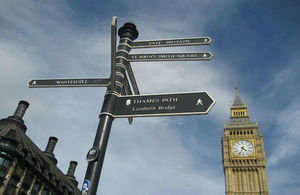Government lawyers discuss their experiences as legal trainees
Qualified lawyers provide an insight into what you might expect as legal trainees

Big Ben Whitehall
Introduction
The structure of a training contract or pupillage in government departments such as the Government Legal Department (GLD) and HM Revenue & Customs (HMRC) may be similar to those offered by many other legal recruiters.
The work you will perform will be very different.
You can expect to be closely involved in challenging, high profile and unique legal work throughout your legal training. You will have an active role to play in casework. You will liaise with government ministers, senior policy makers and counsel. And you will have an opportunity to participate in the legislative process itself.
Below, previous legal trainees from 2 government departments discuss some of the highlights of their pupillages and training contracts.
Government Legal Department
The Government Legal Department (GLD) provides legal services to the majority of central government departments.
Beena Kabir, Chris Burge, Martin Jordison and Natasha Glover spent their training contracts within the GLD.
Between them, during their training contracts, they undertook 6 month seats within GLD’s litigation division, the Ministry of Justice, the Department for Education, the Ministry of Defence, the Cabinet Office and the Department for the Environment, Food and Rural Affairs.
As Beena explains:
“GLD handles a wide range of legal work for the government, covering public and private law, litigation and advisory work. The legal training replicates this and trainees currently undertake two litigation seats and two advisory seats. One of the litigation seats is usually spent in a private law team and one in a public law team. One of the advisory seats will usually be spent within a particular policy area while the other seat will be spent dealing with issues across different departments.”

Beena Kabir, GLD
Similar to HMRC, GLD aims to ensure that its legal trainees are involved in the broadest range of its work. GLD lawyers litigate in all types of courts and are closely involved in the legislative process – and GLD trainees can expect to be part of this work.
Chris’s experiences during his training reflect this ethos:
“I worked on a huge variety of matters, ranging from assisting on a reference to the Supreme Court regarding whether one of the devolved institutions was acting beyond the relevant devolution settlement, through to drafting secondary legislation to enable a Local Authority to host the Tour de France. Being notified that the Tour de France Statutory Instrument had come into force was a proud moment – something I had drafted had become law!”

Chris Burge, GLD
Involvement in the legislative process is an opportunity which is unique to legal trainees working in government.
Natasha undertook an advisory seat within the Department for the Environment, Food and Rural Affairs:
“A lot of work involved legal research and producing written advice, mainly within the area of water law. My time in Defra coincided with the progress of the Water Act 2014 through the House of Lords and the House of Commons. The opportunity to observe this at close quarters was a real highlight for me. I thoroughly enjoyed seeing the law being made before my very eyes!”

Natasha Glover, GLD
Martin worked in a number of different GLD departments during his time as a trainee solicitor and worked on matters which were in the public eye:
“During my final seat at the Department for Education, I worked on some high profile education matters of national importance which dominated the headlines, specifically within the Academies and Free Schools programme. Being involved in urgent, high profile work which was receiving wide exposure in the media was a fascinating experience. The coverage and dominance of the matters emphasised the significance and national importance of the work.”

Martin Jordison, GLD
HM Revenue and Customs
HM Revenue and Customs (HMRC) is the government department responsible for the collection and management of the public revenue from tax and national insurance. The work of its legal team is divided into two broad categories; advisory work and litigation work.
Christie Morgan joined HMRC as a pupil barrister. As a qualified lawyer Christie works in HMRC’s Corporate Tax advisory team. Christie says:
“I wanted to pursue a legal career which had a real and tangible impact. As a pupil barrister within HMRC, I’ve had the opportunity to get involved in cases which are high profile, high value and legally complex.”

Christie Monaghan, HMRC
Although they work under the supervision of more senior colleagues, trainee solicitors and pupil barristers will find themselves afforded a significant amount of responsibility at a very early stage of their legal career. As Christie explains:
“I had my own caseload and also assisted other members of the team with their cases. I conducted hearings in the High Court, the Central Family Court and in the Magistrates’ Courts. I also had the opportunity to draft various court orders, witness statements and pieces of advice.”
While challenging, this level of early responsibility is also highly rewarding. Christie regards one of her favourite experiences as a pupil as being:
“My first time ‘on my feet’ in court where I had to draft the order while the hearing was taking place and also trying to liaise with counsel for an interested party! It was very stressful but the court granted what I was seeking and it was a huge sense of satisfaction and achievement.”
And what aspects of working in the HMRC legal team that Christie would recommend to others?
“HMRC handles cases involving a wide range of tax disputes and this includes major litigation for the purpose of tackling tax avoidance. This work seeks to protect vast sums of tax and can be very high profile. It is very exciting to see a case that you have had an involvement in splashed across the news. Working for HMRC demonstrates that tax and the law surrounding it is incredibly diverse and permeates into most areas. If you want to be at the cutting edge working on cases that ultimately affect all of us, then this is the department for you.”
Summary
Each trainee’s experience will differ according to factors such as the department that they work for and whether they are training to be a solicitor or barrister. But, there is one thing that all legal trainees can be assured of. As Beena says:
“The work is very different from anywhere else. You are able to gain experience in dealing with law and politics which are both interesting, high profile and often in the media. Trainees are given very early responsibility but there’s plenty of support when you need it! All in all, it’s great place to develop your legal skills and knowledge.”